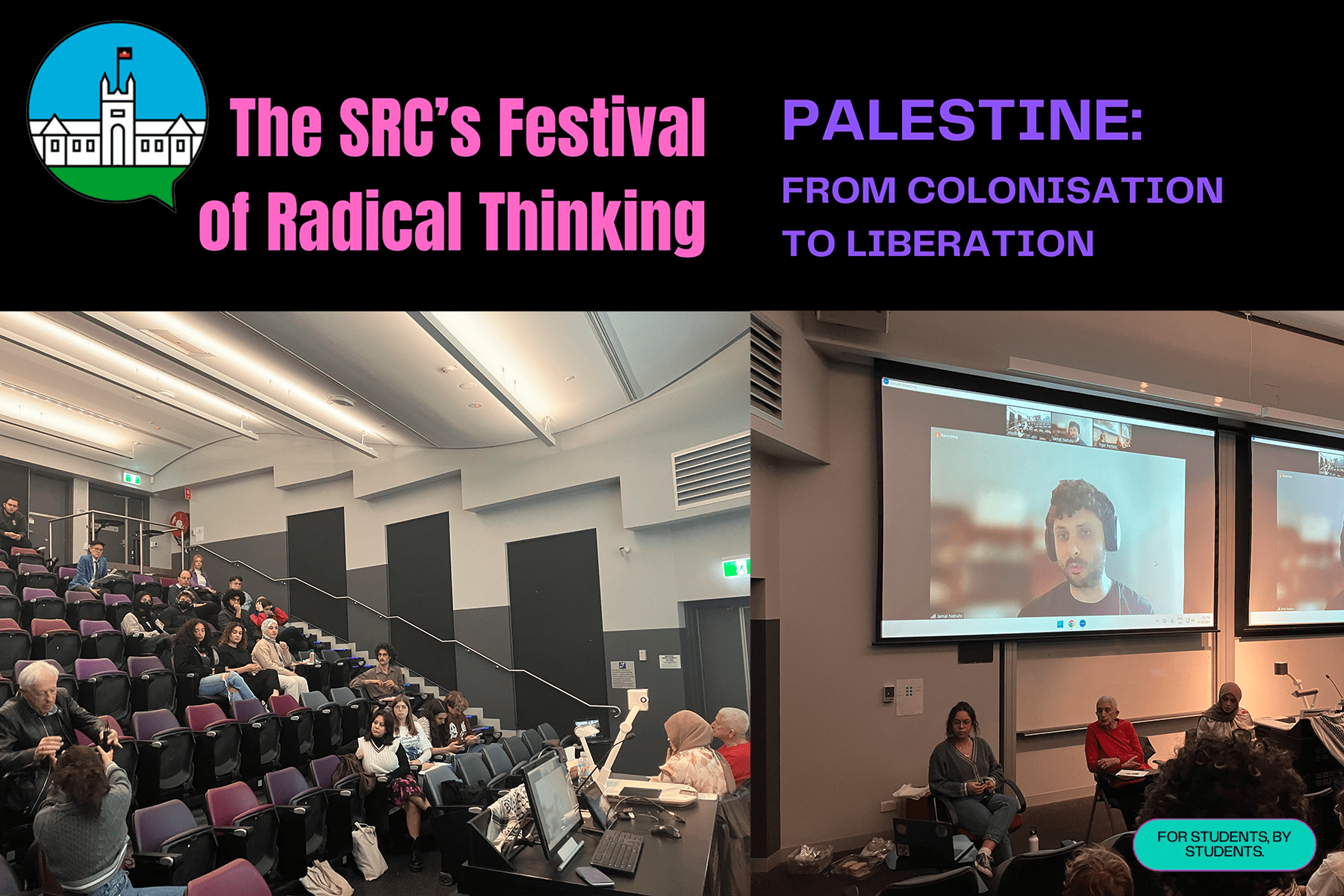Students and academics attended a forum on Palestinian liberation, “Palestine: From Colonisation to Liberation”, as part of the SRC’s annual Radical Education week. The session was chaired by the USyd Ethnocultural Officer, who is also the convenor for USyd’s Autonomous Collective Against Racism (ACAR).
The panel was comprised of three speakers: Ronit Lentin, an Israeli/Irish political sociologist and lifelong Palestine activist; Al-Shayma Nahya, a Palestinian Masters student pursuing a thesis in legal anthropology involving Palestinian refugees; and Jamal Nabulsi, a PhD candidate at the University of Queensland researching emotion & resistance, graffiti & hip-hop in Palestine.
The chair opened the forum with an Acknowledgement of Country, noting the solidarity between Palestinians and the First Nations people in so-called Australia. They stated the importance of “decolonis[ing] the framework of expertise and academia.”
“Everyone is an expert, especially people with lived experience.”
In light of these modes of knowledge building, speakers shared their experiences as activists, and stories of Palestinian oppression.
Nahya shared their grandfather’s story who was expelled from Palestine in 1948. They emphasised the swift brutality of the Israeli forces: “My grandfather was 11 years old and he watched as these leaflets were being thrown from aeroplanes saying, ‘You better leave your village within this short amount of time or otherwise we’re going to be coming in and cleansing you out.’”
Eventually Nahya’s grandfather was separated from his brother: “The soldiers had moved on so quickly that there was no return back.”
Nahya recommended that attendees read Palestinian Identity: The Construction of Modern National Consciousness by Rashid Khalid and Legacy of Empire: Britain, Zionism and the Creation of Israel by Gardner Thompson, to learn more about the political history of Palestinians and their struggle.
Lentin shared her personal history in becoming an ally and activist for Palestinian liberation as a Jewish person. She spoke on her experience during the Naksa, where Israel took all that remained of Palestine in 1967, as her father was one of the soldiers who occupied Hayfa.
“Hayfa was, in fact, taken brutally because it lived on a hill and the bombs were rolling down from the hill to the bomb area.” Lentin said how she became an activist in ‘67: “[the] Naksa made me into a pro-Palestine activist because they explained to me the reality, and since then, once you know how things are you can’t unknow it”.
Responding to the Zionist framing that Palestine-supporting Jewish people are “self-hating”, Lentin affirmed, “I am a self-loving Jew who is actively supporting Free Palestine.”
Lentin elaborated that the apartheid Israeli state is only tightening its grip, saying that settler colonialism is built on “eliminating the natives”. “Israel is actively enacting a racial rule in everyday acts,” said Lentin, speaking on the torture of children, Palestinians killed with “total impunity”, and the recent case of a Palestinian man being branded with the Star of David.
In persevering through these struggles, Nabulsi spoke on the Palestinian cultural value of “Sumud”, which roughly translates to steadfastness. He related this to the strength of Palestinian captives, “refusing to give into [torture] when under interrogation.”
The panel spoke on the role of allies in supporting the cause. Lentin said that as allies, “Our job is to help them in ending israel…instituting a new political entity which Palestinians should determine.”
Nabulsi said that Boycott, Divestment and Sanctions (BDS) is a crucial way of supporting Palestine. Nahya echoed this in “providing some global solidarity to the Palestinian struggle,” giving the example of Puma, who sponsors the Israeli football team.
The most illuminating part of the panel discussion was about what a liberated Palestine looks like. Both Nabulsi and Nahya noted that there is a pressure to have nuanced positions on specific solutions, which can often be unhelpful. Nahya put it succinctly, saying that it is “as simple as saying, ‘Israel is a settler colonial state, I support the Palestinian state’.”
Lentin said that a solution would require the ending of Israel, saying that “Israel as a Jewish state must not exist anymore.” Ultimately, Lentin said that the solution must be led by Palestinians and not Jews or Israeli Jews. She also quoted post-colonial theorist Frantz Fanon saying decolonisation is disorder, and affirmed that the process will not be easy.
The chair of the forum had said at the beginning of the forum that knowledge sharing in both First Nations and Palestinian is through “really long conversations over ample food.” Despite the weight of the discussions during the session, there was a warmth in the room — a reminder that political struggle often begins with solidarity and love.





